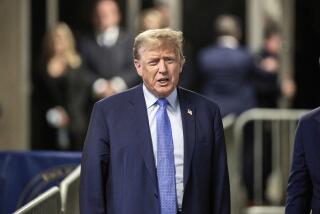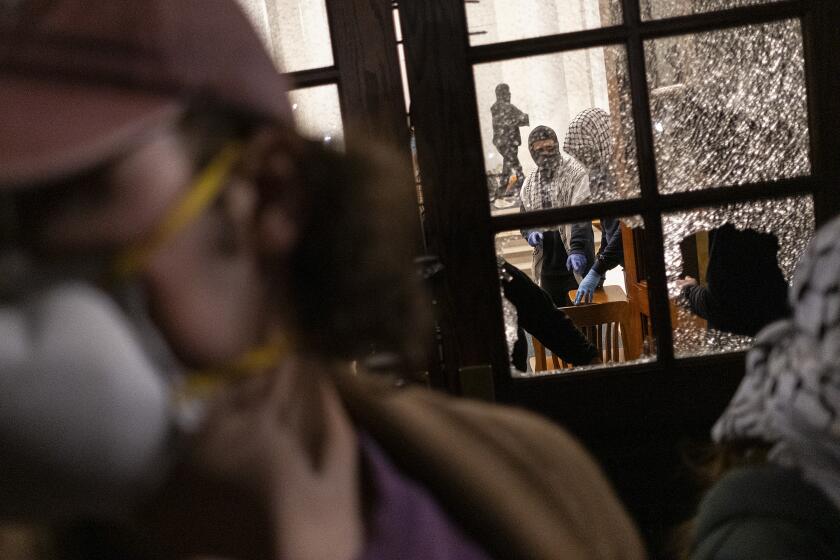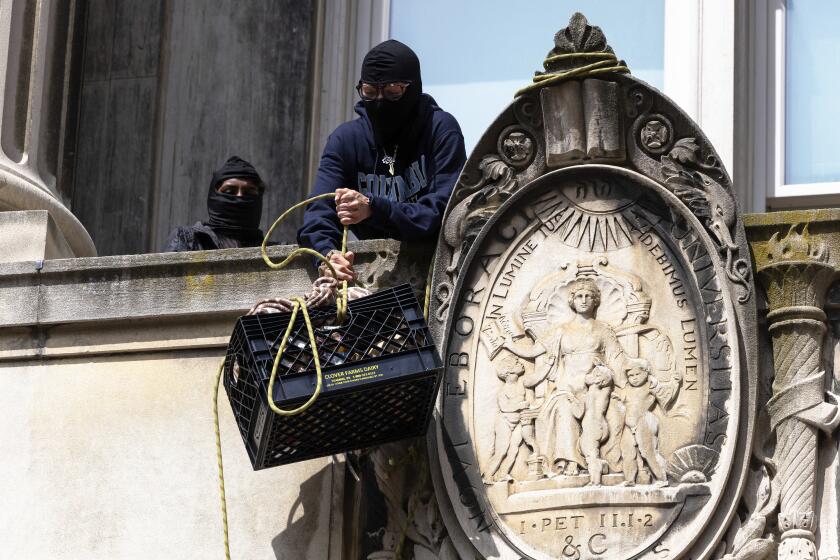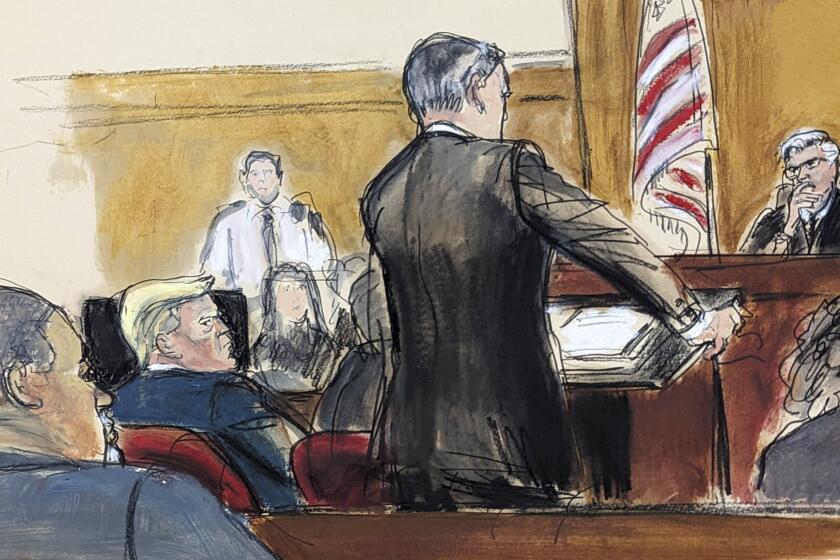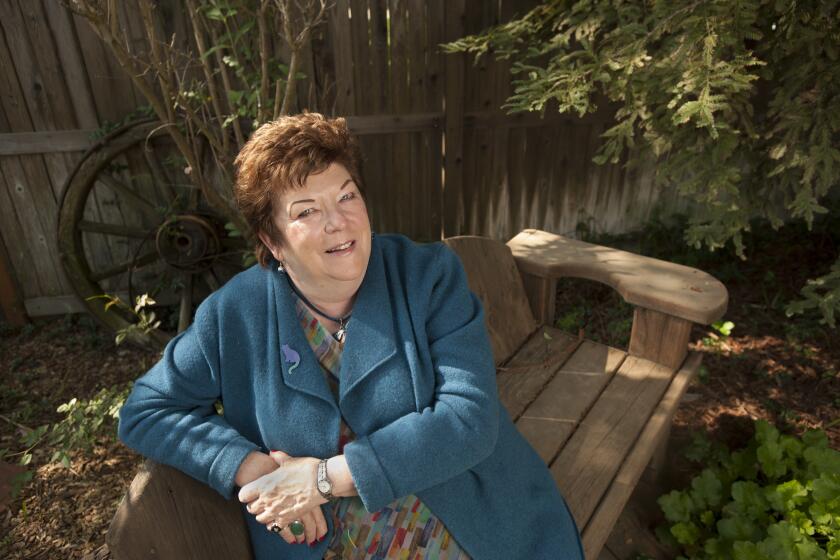Frist Pushes Toward Showdown on Judges
Senate Majority Leader Bill Frist moved the chamber closer Tuesday to a long-threatened showdown between Republicans and Democrats over President Bush’s controversial judicial nominations.
Frist (R-Tenn.) said he intended to bring the first of several of Bush’s nominations to the Senate floor for a vote after the chamber passed a transportation funding bill, which was expected by the end of this week.
“Now is the time to address” the judicial issue, Frist said at his weekly news conference.
Democrats are threatening to filibuster three of the four judicial nominees awaiting confirmation by the Senate. If Democrats call a filibuster on one of them, Frist has said he will move to change Senate rules to prohibit use of the tactic to block the confirmation votes on judges.
It takes 60 votes to cut off a filibuster. During Bush’s first term, Democrats used the filibuster to block votes on 10 of his choices for federal appellate courts, contending that the nominees were extremist in their conservative views. Democrats participated in the confirmation of about 200 of the president’s judicial nominees.
This year, Bush renominated seven of those who had been blocked. Four of them have been approved by the Senate Judiciary Committee.
If the rule change on the filibuster passes, it would clear the way for all of Bush’s judicial nominees to have up-or-down votes. To win confirmation, they would need 51 votes in the 100-seat Senate. The GOP holds 55 seats.
Republicans accuse Democrats of breaking Senate tradition by resorting to the filibuster to block judges. Democrats accuse Bush and his Republican allies of breaking tradition by continuing to push for controversial choices.
Frist declined to say which nominee he expected to bring up first for a vote -- a choice that could determine how rapidly the confrontation escalated.
This week, Minority Leader Harry Reid of Nevada urged Frist to defuse tensions by proceeding with one of the less-controversial nominees. He suggested starting with Thomas B. Griffith, whom Bush had picked to serve on the Court of Appeals for the District of Columbia.
Griffith is one of the four nominees pending before the Senate. Reid said that although many Democrats opposed him, they would not organize a filibuster against him.
On Thursday, the Judiciary Committee is expected to send a fifth nominee to the Senate floor: William H. Pryor Jr., who was renominated by Bush to the 11th Circuit Court of Appeals in Atlanta. Although Democrats filibustered his nomination in the past, they have signaled that they will not do so again.
“We don’t like any of those five,” Reid said. “But in an effort to work toward saving this institution ... I would be willing to give up on any one of those five.”
However, that left open the prospect that Democrats would filibuster Bush’s other controversial nominees.
The other nominees pending before the full Senate are California Supreme Court Justice Janice Rogers Brown, Texas Supreme Court Justice Priscilla R. Owen -- a favorite among conservative activists -- and William G. Myers III, a former ranching and mining lobbyist.
Republican leaders have sent conflicting signals about which of the nominees they would probably bring to the floor first.
In his comments to reporters, Frist singled out Owen for praise, saying “it is just wrong that we do not allow her, after four years [since she was first nominated], that courtesy of an up-or-down vote.”
But a short while later, former California Gov. Pete Wilson appeared at the Republicans’ weekly policy luncheon to brief his former Senate colleagues about Brown, who served for three years as his legal affairs advisor.
Afterward, Wilson said he believed Democrats were trying to demonize her, comparing her nomination to that of Supreme Court Justice Clarence Thomas. Brown and Thomas are African American.
“I think that is most anathema to her Democratic critics -- they don’t like the idea of articulate conservatives and they particularly don’t like when it’s a person of color,” Wilson said. “I don’t think that’s a new phenomenon here.”
Both sides acknowledge that the central issue in the Senate conflict is less the current list of nominees than the possibility of a Supreme Court vacancy later this year.
“This fight is not about the seven radical nominations,” Reid told reporters.
“It’s about clearing the way for a Supreme Court nominee who only needs 51 votes, not 60,” for confirmation.
Frist said that Republicans “have to look to the future to see that nominees for ... the circuit court level and the Supreme Court have that opportunity for an up-or-down vote.”
Conservatives in and out of the Senate have been urging Frist to move quickly, in part to ensure that Democrats are disarmed of the filibuster before a Supreme Court vacancy. “I’ve been advocating for months that we should move on this,” said Sen. George Allen (R-Va.), who called Democratic filibusters of judicial nominations an important political issue. Leaders on both sides said they saw little room for a deal to avert the confrontation.
Reid sent a letter to Frist formally rejecting a compromise offer the GOP leader proposed last month, in which he offered as much as 100 hours of debate before a confirmation vote on a nominee.
“In essence, you propose to eliminate the role of the Senate minority in considering judicial nominees,” Reid wrote. “That result is unacceptable.”
And the Senate’s No. 2 Republican, Majority Whip Mitch McConnell of Kentucky, denounced an earlier bid from Reid offering confirmation of some judges in return for the withdrawal of others as “a sort of spin-the-bottle approach under which somebody, just through random selection, is denied an up-or-down vote.”
More to Read
Get the L.A. Times Politics newsletter
Deeply reported insights into legislation, politics and policy from Sacramento, Washington and beyond. In your inbox three times per week.
You may occasionally receive promotional content from the Los Angeles Times.


